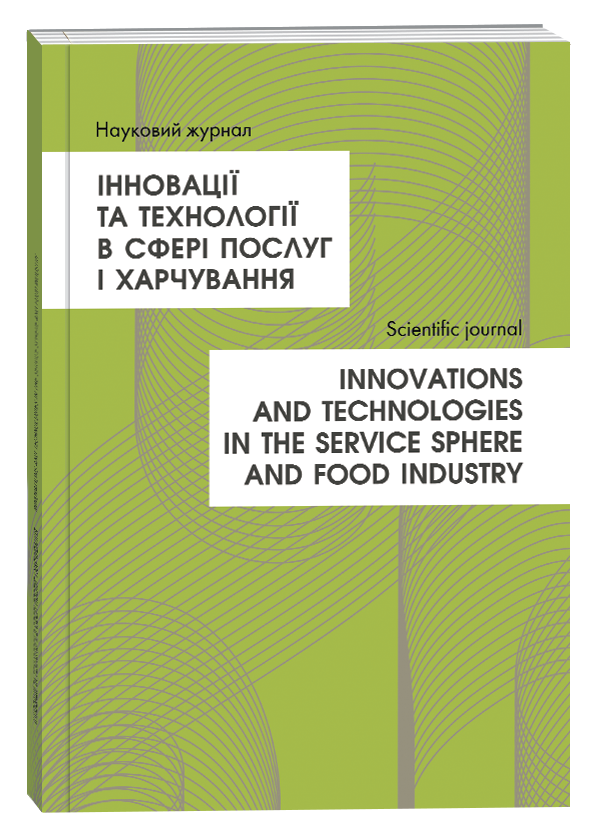USING THE APPARATUS OF FUZZY SET THEORY TO ASSESS THE QUALITY OF A TOURISM PRODUCT
Abstract
The article examines the problems that arise in terms of personalization of the tourist product and the need to choose it taking into account the needs of each client. A toolkit for modeling the management decision regarding the choice of the "best" tourist product among a set of alternatives has been built, which is based on the use of the apparatus of the theory of fuzzy sets. A list of the most important criteria was formed to evaluate alternative options of the tourist product: cognitive attractiveness factor; coefficient of quality of accommodation services; coefficient of quality of transport services; food quality factor; coefficient of quality of excursion service; coefficient of conformity of the price to the quality of the tourist product. Since the evaluation criteria contain subjective, qualitative characteristics, the apparatus of the theory of fuzzy sets and the concept of a fuzzy relationship are used to model the management decision. At the same time, the characteristics of each tourist product according to the selected criteria are presented in the form of expert evaluations provided by several experts. Matrices of relationships containing relevant expert assessments are formed using Harrington's verbal-numerical scale. Based on the constructed relationships, a summary matrix of expert evaluations and fuzzy sets for each of the criteria is formed. At the same time, if the evaluation is based on the best value, then the combined ratio operation is used to construct the composite ratio, while if the evaluation is based on the worst value, then the intersection of the ratios is used. On the basis of fuzzy sets for each of the criteria, the membership function of alternative variants of the tour product is formed. The "highest quality" is a tourist product for which the function of belonging has the highest importance. In order to obtain a more accurate assessment of the quality of the tourism product, it is proposed to use both approaches - using the combination and intersection of fuzzy relations. In the future, the proposed toolkit can be used for effective management of the quality of a tourist company, which will allow adapting its activities to the needs of the client.
References
Борисов А. Н., Кроумберг О. А., Федоров И. П. (1990). Принятие решений на основе нечетких моделей: примеры использования. Рига: Зинатве, 184.
Заде Л. А. (2015). Нечеткие множества, нечеткие системы и мягкие вычисления, том 10, вып. 1, 7–22. Взято з http://www.mathnet.ru/links/69118c2a7a7bc025048c1af33567042c/fssc12.pdf.
Иванов И. С. (2011). Повышение качества туристского продукта в условиях персонализации систем дистрибуции: автореф. дис. экон. наук, Москва. Взято з https://economy-lib.com/povyshenie-kachestva-turistskogo-produkta-v-usloviyah-personalizatsii-sistem-distributsii.
Магомедалиева Х. Н. (2008). Развитие механизмов оценки и повышения качества туристических услуг: автореферат дис. канд. экон. наук: 08.00.05. Махачкала.
Моделі й методи прийняття рішень: навч. посіб. (2018). С. А. Ус, Л. С. Коряшкіна. М-во освіти і науки України, Нац. техн. ун-т «Дніпровська політехніка». 2-ге вид. випр. Дніпро: НТУ «ДП», 300.
Пестушко В. Ю. (2020). Макроекономічна роль туризму: реалії країн світу / В. Ю. Пестушко. Науковий вісник Ужгородського національного університету. Вип. 29, 114-119. Взято з http://www.visnyk-econom.uzhnu.uz.ua/archive/29_2020ua/24.pdf.
Піскунова О. В. (2015). Нечіткі відношення у дослідженні інноваційного розвитку малого підприємства / О. В. Піскунова, Л. Г. Тарасова, І. Ф. Шатарська. Ефективна економіка. (№ 5). Взято з http://nbuv.gov.ua/UJRN/efek_2015_5_10
Трояновский В. М. (2002). Математическое моделирование в менеджменте. М.: РДЛ, 256.
Яхъяева Х. Н., Ханухова С. А. (2006). Методические основы комплексной оценки уровня качества туристских продуктов. Транспортное дело России. №12. Часть 1.
Borisov A. N., Kroumberh O. A., Fedorov I.P. (1990). Prinyatie reshenij na osnove nechetkikh modelej: primery ispolzovaniya [Decision making based on fuzzy models: examples of use]. Riga: Zinatve, p. 184.
Zade L. A. (2015). Nechetkie mnozhestva, nechetkie sistemy i myahkie vychisleniya [Fuzzy Sets, Fuzzy Systems and Soft Computing], tom 10, vol. 1, pp. 7–22. Available at: http://www.mathnet.ru/links/69118ts2a7a7bts025048ts1af33567042ts/fssts12.pdf.
Ivanov I. S. (2011). Povyshenie kachestva turisticheskogo produkta v usloviyakh personalizatsij sistem distributsij [Improving the quality of the tourist product in the context of personalization of distribution systems]. (PhD Thesis), Moskva. Available at: https://etsonomy-lib.tsom/povyshenie-kachestva-turistskogo-produkta-v-usloviyah-personalizatsii-sistem-distributsii.
Mahomedalieva Kh. N. (2008). Razvitie mekhanizmov otsenki i povysheniya kachestva turisticheskikh uslug [Development of mechanisms for assessing and improving the quality of tourist services] (PhD Thesis), Makhachkala.
. Us S. A, Koryashkina L.S. (2018) Modeli y metody pryynyattya rishen [Models and methods of decision making]. M-vo osvity i nauky Ukrayiny, Nats. tekhn. un-t «Dniprovs'ka politekhnika». Dnipro: NTU «DP», p. 300.
Pestushko V.Yu. (2020). Makroekonomichna rol turyzmu: realiyi krayin svitu [Macroeconomic role of tourism: realities of the country's world]. Naukovyy visnyk Uzhhorods'koho natsional'noho universytetu, vol. 29, pp. 114-119. Available at: http://www.visnyk-etsonom.uzhnu.uz.ua/archive/29_2020ua/24.pdf.
Piskunova O.V., Tarasova L. G., Shatarska I. F. (2015). Nechitki vidnoshennya u doslidzhenni innovatsiynoho rozvytku maloho pidpryyemstva [Misunderstandings in the advanced innovative development of small businesses]. Shatars'ka. Efektyvna ekonomika, no. 5. Available at: http://nbuv.gov.ua/UJRN/efek_2015_5_10
Troyanovskij V. M. (2002). Matematicheskoe modelirovanie v menedzhmente [Mathematical modeling in management]. M.: RDL, p. 256.
Yakhyaeva Kh.N., Khanukhova S.A. (2006). Metodicheskie osnovy kompleksnoj otsenki urovnya kachestva turisticheskikh produktov [Methodological bases for a comprehensive assessment of the quality level of tourist products]. Transportnoe delo Rossii, no. 12. part 1.



